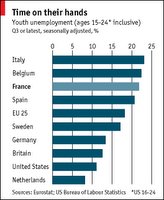 they could've back-slid by now, everyone would understand that and accept it as normal. Besides, the Kuwaitis are Muslim which accounts for more than gratitude for a 4-day war. That's my reasoning for using the Kuwaiti news announcement of King Abdullah of Jordan's letter directing his new prime minister to fight Islama-terrorism. At least the Kuwaiti news agency is not a sure-thing for being pro-American, and being located right there in the region, have a better chance of getting the story right.
they could've back-slid by now, everyone would understand that and accept it as normal. Besides, the Kuwaitis are Muslim which accounts for more than gratitude for a 4-day war. That's my reasoning for using the Kuwaiti news announcement of King Abdullah of Jordan's letter directing his new prime minister to fight Islama-terrorism. At least the Kuwaiti news agency is not a sure-thing for being pro-American, and being located right there in the region, have a better chance of getting the story right. 
And yeah, OK, King Abdullah is half British (on his mother's side) which may account for some preference for the Anglo-American point of view. So I am aware of several sources of likely bias.
But why is Jordan, a small Muslim country surrounded by enemies whose population is totally infiltrated by Palestinians, leading the charge against Militant Islamism? Surely it's not only sympathy for the wedding party who was bombed by Zawaqawi, nor watching American soldiers fight Militant Islamists next door that motivated Abdullah to take such a risk. Could it be that he's drunken of the American Koolaid? Maybe he sincerely believes that democracy really is an effective form of government, that it will let the most people live their lives the way they want to?
Some liberals may say, "what arrogance to try to impose our world view on other populations! If the populance acquiesces to dictatorship whether from active choice (as in the cases of North Korea and Vietnam) or from passivity (as in Iraq), we should let them 'enjoy' their choice." I suppose it's a credible argument that the American strategy of military invasion and occupation is no different from the Militant Islamists' 'jihad' to save the world from Western heretic decadence. They're trying to save our souls, or at least our morals from ourselves.
So who is more righteous? Is it more morally justifiable to use force to create an enviroment where people can choose to be observant or not, or to enforce an environment where people have no choice?






